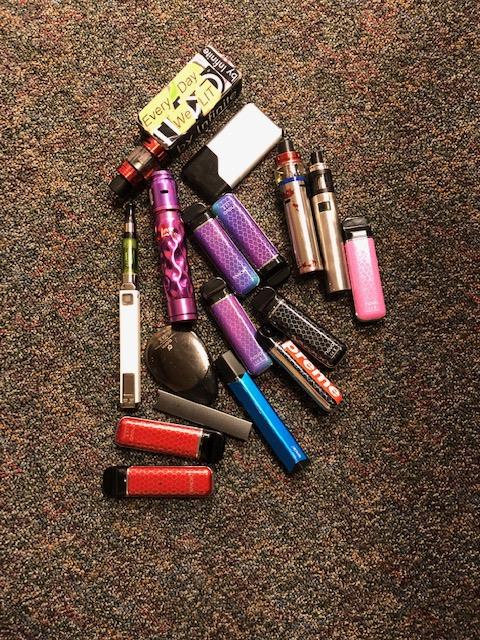How Do Rocky Students Feel About Vaping?
The deans say that on average they confiscate about three vapes per week.
Vaping is the new biggest trend. It’s an easy, portable, and a fun pastime for many people. Companies like Juul, market their products as a safe and more healthy alternative to smoking, but without long-term studies there’s no telling how vaping will affect people after long term use. I interviewed four sophomore students who vape; names have been changed to maintain anonymity.
Ace is a sophomore boy who vapes every few days, but used to vape every day. He and Kathy started their habit at Rocky’s 2018 Homecoming, which is when they believe they both got addicted.
“That’s when we really started,” Kathy said, “and from there it kinda grew. Every single chance we got we went to a bathroom.”
“It used to get really bad,” Ace said, “where we used to go like every single passing period.”
All described that when they are around certain places and people, they feel a craving to vape.
“We’ll go hang out,” Ace said, “we’ll be in a car, in someone’s room. Anytime we’re together and not around other people.”
The trio’s friend Cee says she doesn’t believe she’s addicted, but one of her “triggers” is being alone in her bedroom.
Kathy says that she and Ace’s mutual addiction was bad enough that they started to no longer feel the effects of the nicotine. Kathy, Ace, and their other friend, Marie, all decided that they should take a break from vaping for a week. They started feeling withdrawal, all with different effects.
“I was always pissed off,” Ace said, “and I would get like, grumpy. I’d get really, like, impulsive. I tried to drop a couple classes.”
“You get anxiety,” Kathy said. Marie, who’s been vaping on and off for two years, stopped eating and became depressed. The three described a trip to Panda Express where they all became angry and realized how irritable withdrawal was making them.
“Basically I was just like, “This is bullsh-t, I don’t like this anymore,'” Kathy said about deciding to take a break, “so I said ‘I’m just gonna stop’, and we all said we were just gonna stop.”
Six days into the planned week-long break, Ace caved and borrowed a Juul. He didn’t feel the same adverse effects as the two girls doing the break with him and didn’t want to continue. Since he started vaping regularly those six days are the longest break he’s taken.
Kathy and Ace argued throughout the interview about Ace’s unwillingness (or inability) to quit. Kathy described Ace as having “no willpower” and “no self control.”
The four sophomores are not legally allowed to own or buy vapes, but all say they get supplies from older siblings or students. Kathy said she even bought a vape off of the website Wish because she didn’t need an ID.
Kathy is the only one of the four to ever be caught by an adult. Her mother caught her dealing Juul pods and became upset. Ace gave one of his friends about $100 worth of Juuls and pods in an attempt to quit, and that friend was caught by her mother. He didn’t get in trouble.
“It’s expensive,” Kathy said. “Tt takes a toll on your money. And then it also wrecks your relationships, but at the same time it’s really fun!”
Kathy says Juuling and vaping should be treated more like alcohol, as a recreational thing. She says, like alcohol, the point where vaping becomes dangerous is when it morphs from a social habit into an addiction.
“We have a need to rebel,” Cee said when asked what she thinks motivates vaping. “For me, its sort’ve like the experience, what does it feel like to hide something this big from my parents?”
All of the interviewees resented the idea that they would become smokers. They say that vaping hasn’t encouraged them to start smoking, just to keep vaping.
“I guess it is bad that we’re getting a new generation addicted to nicotine,” Ace said.
“But we’re confronting it the wrong way,” Kathy replied. “Instead of scaring kids away from it and stopping the research, we should just accept it.”
When asked about the side-effects, all said that they believed it was primarily the addiction that was dangerous. They don’t believe that vaping has any health effects beyond the addiction. They all say they research the juice they buy.
However, new studies show that vaping may have the same long term effects as nicotine. Nicotine elevates heart rate and can cause cardiovascular issues, especially in those who have a preexisting susceptibility.
Here’s where people get defensive–they say they’ve removed the nicotine from the vape and it’s now safe. But even without nicotine, research shows vaping is still dangerous.
Then, the interviewees described how they’ve had mood swings from the addiction, making them happy, sad, anxious, and lethargic. The addiction, to them, is the strongest effect of vaping.
“It’s not like you’re constantly thinking about it,” Ace said, “but it’s always, like, there.”

Payton is a senior at Rocky Mountain High School. They've been on the newspaper staff for 3 years. After high school, Payton wants to work as an investigative...







